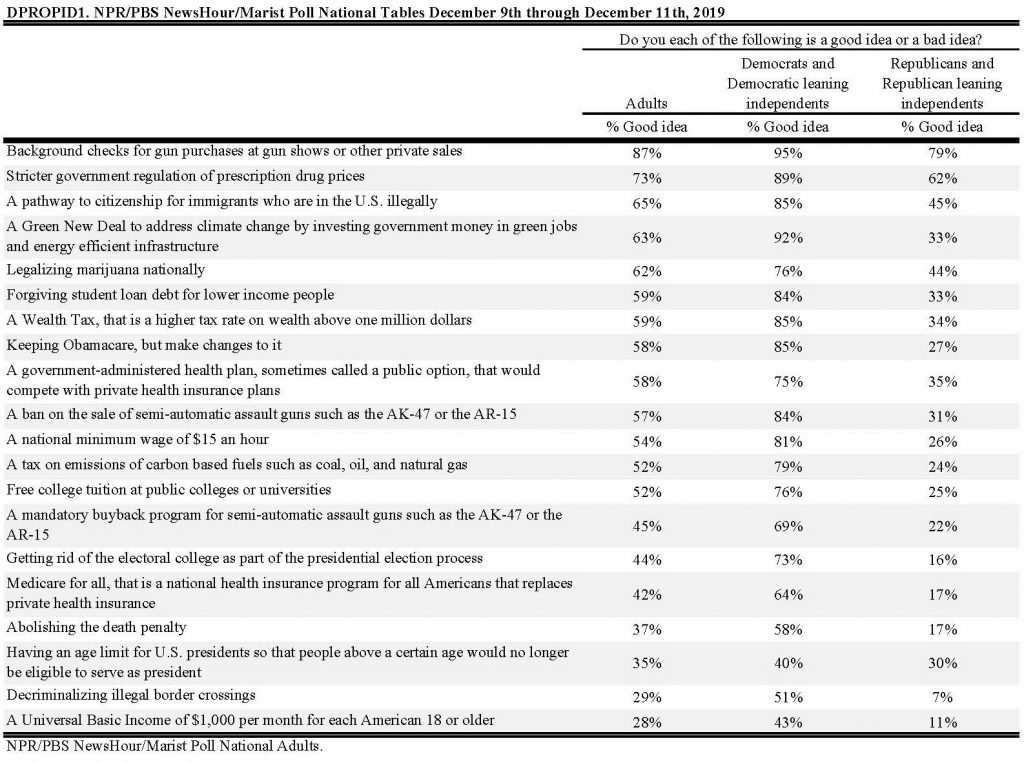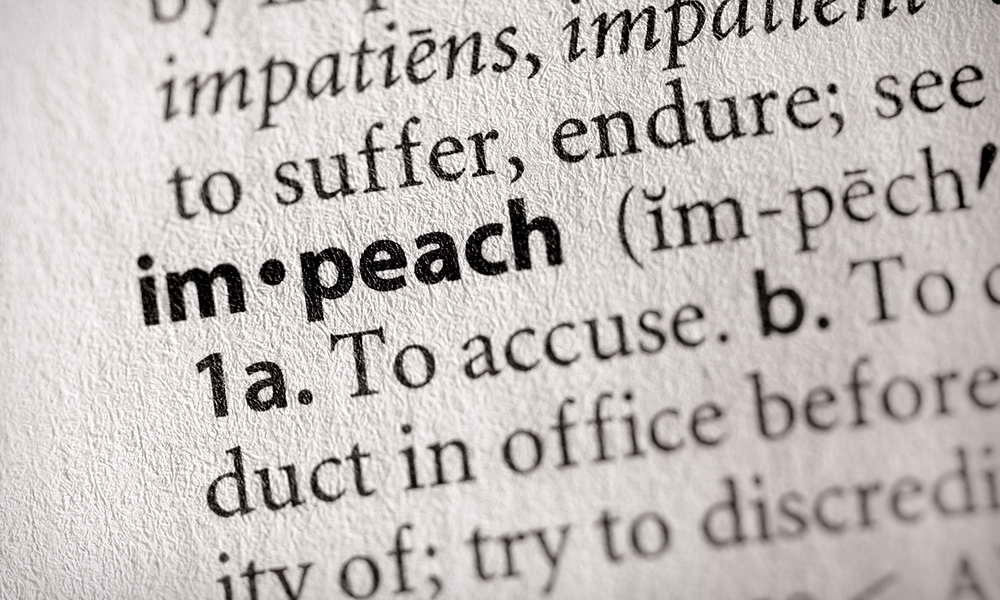December 16, 2019
Impeachment, 2020 Elections, and Issues, Dec 2019
NPR/PBS NewsHour/Marist National Poll
As the House of Representatives moves forward with impeachment proceedings against President Donald Trump, Americans remain divided on the issue. 48% of U.S. residents say they oppose the impeachment of the president, 47% support it, and 5% are unsure. When last reported in November, 47% of Americans supported impeachment, and 46% opposed it. While partisan allegiances remain in place, independents have moved from +10 percentage points in opposition to impeachment (41% to 51%) to +3 percentage points against it (46% to 49%).
Americans also divide about whether or not the U.S. Senate should remove President Trump from office. 49% oppose the move while 46% support it. 94% of Republicans oppose removing the president from office as do 12% of Democrats. 81% of Democrats support removal compared with only 4% of Republicans who share this view. Among independents, 52% currently oppose removing the president from office, and 45% support the action.
Overall, 47% of Americans both oppose impeachment and oppose removing President Donald Trump from office. 44% of Americans support both the impeachment and removal of the president. These proportions are little changed from November’s NPR/PBS NewsHour/Marist Poll.
“It’s like the hearings have never happened,” says Dr. Lee M. Miringoff, Director of The Marist Institute for Public Opinion. “The arguments have only served to reinforce existing views and everyone is rooting for their side.”
Turning to the 2020 presidential campaign, Joe Biden (24%) and Bernie Sanders (22%) lead the Democratic field among Democrats and Democratic-leaning independents including those who are undecided yet leaning toward a candidate. Elizabeth Warren (17%) and Pete Buttigieg (13%) follow. Support for Andrew Yang (5%), Michael Bloomberg (4%), Amy Klobuchar (4%), Cory Booker (4%), Julian Castro (1%), Tulsi Gabbard (1%), and Michael Bennett (1%) is in single digits. More than three in ten moderates (31%) support Joe Biden. Among progressives, Sanders (29%) edges Warren (23%) by six percentage points.
“This is the national lay of the land for the Democrats, and shortly, the individual states will weigh in as the primaries get started,” says Dr. Lee M. Miringoff, Director of The Marist College Institute for Public Opinion. “Despite everything that’s happened so far — campaigning, endorsements, fundraising, and debates — most Democrats are still shopping.”
More than three in four Democrats and Democratic-leaning independents (76%) say they have not made up their mind about whom they will support in the primary. 24% have made a decision. These proportions are nearly identical (75% and 24%, respectively) to those reported in November.
Still, 65% of Democrats and Democratic-leaning independents report they are satisfied with the candidates from which to choose. 29% are dissatisfied. In November, 69% considered the field to be acceptable, and 23% said it was not.
What’s important in a Democratic nominee for president? By a 10-point margin, Democrats and Democratic-leaning independents say a nominee who has the best chance of beating Trump in November (54%) is more important than a nominee who shares their positions on most issues (44%). Previously, a candidate’s electability (58%) was favored over a candidate’s position on the issues (39%) by a 19-point margin.
Nearly half of Democrats and Democratic-leaning independents (49%) think it is more important to have a Democratic nominee for president who will move the nation in a different direction from President Obama. 42% believe it is more important to have a Democratic nominee who will, if elected, reassert President Obama’s policies. About four years ago in July 2015, the Democratic electorate divided. 46% wanted the nation to move in a different direction, and 45% thought it was more important to continue the Obama-era policies.
A majority of Americans (51%) think the ideas offered by President Trump are generally moving the country in the wrong direction. 43% believe the president is moving the nation in the right one. Not surprisingly, opinions fall along party lines. 50% of independents think the president is taking the country down the wrong path, and 46% think he has the country of the right track.
But, Americans divide about whether or not the ideas offered by the Democratic candidates running for president will move the country in the right direction (44%) or the wrong one (45%). When this question was last reported in September, 46% of Americans thought the Democratic candidates’ ideas would put the nation on the right track, and 43% said they would take the nation down the wrong path. 49% of independents currently consider the Democratic candidates’ proposals to be an ill fit for the nation, and only 37% think the Democrats will move the country in the right direction.
Drilling down into specific policy areas, here is where Americans stand on several issues driving the Democratic Primary campaign debate. The Democratic candidates are in step with, at least, a majority of Americans when it comes to background checks for gun purchases, stricter regulation of prescription drug prices, a pathway to citizenship, a Green New Deal, legalizing marijuana, forgiving student loan debt, a wealth tax, keeping Obamacare with changes, the public option for health insurance, a ban on semi-automatic assault guns, a $15 minimum wage, a tax on carbon fuel emissions, and free college tuition at public colleges. Republicans also favor background checks for gun purchases and stricter regulation of prescription drug prices.
The Democratic candidates are out of step with Americans when it comes to a mandatory buyback program for semi-automatic assault guns, getting rid of the electoral college, “Medicare for all,” abolishing the death penalty, decriminalizing illegal border crossings, and a universal basic income of $1000 a month.
Neither the Democratic nor Republican electorate want to place an age limit on someone’s ability to serve as president.

“There are definitely issues important to Americans that the Democratic candidates can capitalize on,” says Dr. Lee M. Miringoff, Director of The Marist College Institute for Public Opinion. “For instance, on the issue of health care, they are on firm footing in keeping Obamacare with changes and providing a public option to health insurance. However, they risk losing the campaign narrative when advocating proposals like “Medicare for All,” that do not resonate with a majority of Americans, including 29% of the Democratic electorate.”
President Trump’s job approval rating is 42% among Americans. 52% disapprove. Last month, 41% of adults nationally approved of how the president did his job, and 51% disapproved. 31% of Americans who approve of the president’s performance in office strongly do so and 41% who disapprove are strongly of this opinion.
Complete December 16, 2019 NPR/PBS NewsHour/Marist Poll Release of the United States

